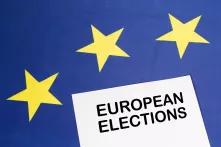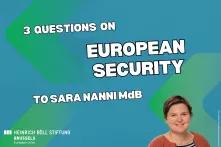Supporting a range of militias in the Middle East and providing weapons to Russia in its war against Ukraine, Iran is increasingly in the geopolitical spotlight. At the same time, Iranian women are still fighting for their rights, while legislative voting took place on 1 March 2024. So, we asked three questions to MEP Hannah Neumann (Greens/EFA), Chair of the EP Delegation for relations with the Arab Peninsula, Member of the EP Delegation for relations with Iran, as well as Standing Rapporteur on Iran, regarding how she sees EU-Iran relations moving forward.

Iran has voted: How do you view the voting result?
First of all, these were not elections. The only choice people had was to stay at home or to confirm the pre-selection of conservative candidates presented to them by the regime. And the majority stayed at home – as a sign of civil disobedience. While in 2009, the question was 'Where is my vote?' Now, we have arrived at a defiant stance of 'Vote or no vote, we will not vote.’ Neither the regime nor the parliament have any legitimacy in the eyes of the majority of Iranians.
You have been a leading voice for Iranian women and the peaceful protest movement – how has the situation developed and what can be done to support this important movement?
Since the protests began, the regime has brutally silenced dissent. Despite this crackdown, people in Iran are still protesting, even at the risk of their lives, albeit less visibly. While our options to influence things from the outside are limited, there are still actions we can take, such as exploring additional sanctions carefully, keeping the issue on the policy agenda, supporting human rights defenders at risk and protestors that need medical support through the facilitation of fast visa processes and supporting independent journalism. Iranians face heavy internet censorship, so we need to provide them with more tools to bypass blocks. Supporting civil society is also crucial, as is extending the UN fact-finding mission's mandate to address rampant impunity. The FFMI's report on violence against protesters might trigger war crimes prosecutions under universal jurisdiction We need to join forces to make sure its mandate is renewed and the crimes for the regime will be documented and eventually brought to justice.
How should the EU respond to Iranian arms exports to Russia and its support for militia groups, such as the Houthis?
It is quite staggering. Russia and Iran have joined forces to circumvent sanctions, and Iran has by now delivered more ammunition to Russia than all EU countries have managed to send to Ukraine. This has not gone unnoticed: The EU swiftly condemned Iran's military support for Russia's aggression against Ukraine, imposing new restrictions on drone parts exports and sanctioning individuals and entities involved in Iran's drone program and threatening Ukraine's sovereignty. Ongoing restrictive measures regarding support for terrorism, such as in Syria, remain in place, with further targeted sanctions possible. In response to Iranian-aligned Houthi militants' attacks on Red Sea shipping, the EU launched a naval mission. However, sanctions alone are limited in effect; they must always be accompanied by other policy measures. Therefore, it is imperative that we develop a new Iran policy for the future, given that the regime denies democratic decision making in the country and deliberately destabilises the whole Middle East through its proxies. We cannot continue as before; new approaches are needed.
The views and opinions in this article do not necessarily reflect those of the Heinrich-Böll-Stiftung European Union.


